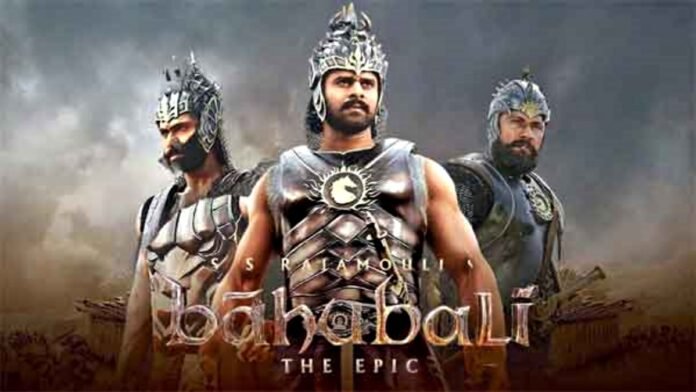
Key Points
- Baahubali: The Epic earns ₹10.4 crore on Day 1, becoming highest-grossing re-release opening in Indian cinema history
- Re-edited 3-hour 44-minute version combines both Baahubali films with remastered visuals and unreleased footage
- SS Rajamouli announces new ₹120 crore 3D animated film “Baahubali: The Eternal War” during intermission
- Telugu markets lead with 63.63% occupancy; film released across 1,150+ screens worldwide, including US, UK, UAE
- Surpasses previous re-release records: Ghilli (₹4.87 cr), Khaleja (₹5.75 cr), and Gabbar Singh (₹5.08 cr)
Mumbai: Director S.S. Rajamouli’s magnum opus has returned to conquer box office records once again, as “Baahubali: The Epic” registered the highest opening day collection for any re-released film in Indian cinema history. Released on October 31, 2025, the re-edited and remastered version, combining both blockbuster installments, proved that the magic of Mahishmati remains undiminished, even years after the original releases.
Record-Breaking Day 1 Performance
According to industry tracker Sacnilk, “Baahubali: The Epic” collected an impressive ₹10.4 crore net at the Indian box office on its opening day, comprising ₹1.15 crore from Thursday’s special paid previews and ₹9.25 crore from the actual release day. This phenomenal debut comfortably surpassed all previous re-release records in Indian cinema.
The breakdown by language versions reveals the film’s pan-Indian appeal: the Telugu version contributed ₹7.5 crore, the Hindi version added ₹1.4 crore, with the remainder coming from Tamil, Kannada, and Malayalam markets. The Telugu market dominated with exceptional theater occupancies, demonstrating the franchise’s enduring stronghold in its home territory.
Occupancy Rates Reflect Audience Enthusiasm
The film registered remarkable occupancy rates across language markets on Friday, October 31, 2025. Telugu audiences led with an overall 63.63% occupancy, with Warangal reporting the highest at 81.50%. Hyderabad alone scheduled 426 shows and achieved a 69.25% occupancy rate, cementing the film’s cult-favorite status.
Other language markets showed solid performance with 12.04% occupancy in Hindi, 15% in Tamil, and 11.49% in Kannada. Night shows proved especially popular across nearly 1,000 shows scheduled in Telugu-dominated regions, with audiences eager to relive the Mahishmati experience on the big screen.
Shattering Previous Re-Release Benchmarks
“Baahubali: The Epic” demolished all existing re-release records in Indian cinema. The film surpassed Vijay’s “Ghilli”, which earned ₹4.87 crore, Mahesh Babu’s “Khaleja”, which collected ₹5.75 crore, and the previous record holder, “Gabbar Singh”, which earned ₹5.08 crore. The re-release also exceeded opening day collections of recent fresh releases, including “Dragon” (₹6.5 crore) and “Lokah Chapter 1: Chandra” (₹2.71 crore).
Industry analysts note that with just its opening day collection, “Baahubali: The Epic” has already become the 9th highest-grossing re-released film in India overall. The film is well on its way to becoming the highest-grossing re-released film in Indian cinema history, with strong weekend trends indicated by bookings on online ticketing platforms.
A Seamless 3-Hour 44-Minute Cinematic Experience
The re-edited version merges “Baahubali: The Beginning” (2015) and “Baahubali: The Conclusion” (2017) into a single, seamless narrative running approximately 3 hours and 44 minutes. Rajamouli has carefully removed certain scenes and sequences to ensure smooth theatrical viewing while adding previously unreleased footage as bonus content for fans.
The remastered version features technologically advanced imagery and visual upgrades that enhance the already spectacular cinematography. Director Rajamouli confirmed that Tamannaah Bhatia’s popular song “Pacha Bottesina” has been removed from this version along with other cuts to streamline the narrative.
The film continues to showcase Prabhas as Amarendra Baahubali and Mahendra Baahubali, Rana Daggubati as the menacing Bhallaladeva, Anushka Shetty as the courageous Devsena, and Tamannaah Bhatia as the fearless Avantika. The supporting cast includes powerhouse performances from Sathyaraj, Ramya Krishnan, and Nassar.
Rajamouli Announces “Baahubali: The Eternal War”
In a major announcement that electrified franchise fans, SS Rajamouli revealed plans for another “Baahubali” film during promotional interviews with Prabhas and Rana Daggubati. The director clarified that this is not “Baahubali 3” but rather a continuation expanding the Mahishmati universe.
“We have made a 3D animated film called ‘Baahubali: The Eternal War,'” Rajamouli announced, describing it as a high-end, big-budget production with an estimated budget of ₹120 crore. The teaser for this ambitious 3D animated spectacle will premiere during the intermission of “Baahubali: The Epic,” marking what Rajamouli calls the beginning of “Phase 2” for the franchise.
This strategic expansion demonstrates the makers’ commitment to building a comprehensive cinematic universe around the legendary kingdom of Mahishmati, similar to Marvel’s approach with superhero franchises.
Global Theatrical Footprint
“Baahubali: The Epic” achieved a stellar international release, being exhibited across 1,150 cinemas worldwide. The film secured 400 screens in the United States, 210 in the United Kingdom and Ireland, with significant presence in the UAE, Australia, and Southeast Asia.
The international markets have responded overwhelmingly, with diaspora audiences eager to experience the complete saga on the big screen once again. Bookings for the epic theatrical run broke records for a re-released Indian film, proving that demand to revisit the legendary world of Mahishmati remains as strong as ever.
Audience Reception: Nostalgia Meets Excellence
Early audience reviews on social media have been overwhelmingly positive, with viewers describing the experience as “wholesome” and praising Rajamouli for “chopping unnecessary parts” while keeping “Prabhas in all his glory”. Fans have been sharing their emotional reactions, recalling the first time they witnessed the Baahubali phenomenon years ago.
The nostalgic element combined with technical enhancements has created a unique theatrical experience that appeals both to devoted fans wanting to relive cherished memories and new audiences experiencing the complete saga for the first time.
The Mahishmati Saga: Power, Sacrifice, and Revenge
For those unfamiliar with the franchise, “Baahubali: The Epic” tells the grand multi-generational story of power struggles, sacrifice, loyalty, and revenge in the fictional kingdom of Mahishmati. The narrative explores themes of dharma (righteousness), duty, love, and the eternal battle between good and evil through the contrasting characters of the noble Amarendra Baahubali and his power-hungry cousin Bhallaladeva.
The combined version allows viewers to experience the complete arc from Mahendra Baahubali’s discovery of his royal heritage to the spectacular revelation of his father Amarendra’s tragic fate, culminating in the epic confrontation that determines Mahishmati’s destiny. This seamless storytelling approach eliminates the years-long wait that original audiences endured between installments, creating a more immersive and emotionally cohesive experience.
Weekend Projections and Future Prospects
With strong occupancy trends and positive word-of-mouth spreading rapidly, industry experts predict a robust weekend performance that could significantly amplify the film’s total collections. The Hindi version is expected to witness substantial growth on Saturday and Sunday based on booking data from online ticketing platforms.
Backed by Arka Media Works, “Baahubali: The Epic” is poised to rewrite re-release economics in Indian cinema, potentially setting benchmarks that will stand for years to come. The film’s success demonstrates that quality content with emotional resonance transcends the typical shelf-life of theatrical releases, offering valuable lessons for the industry about the enduring power of compelling storytelling.













































